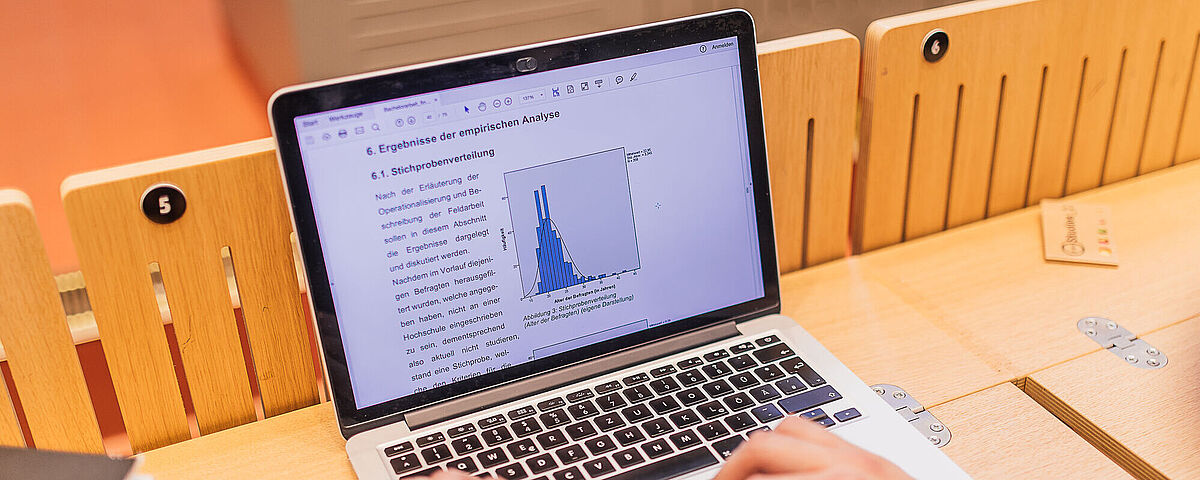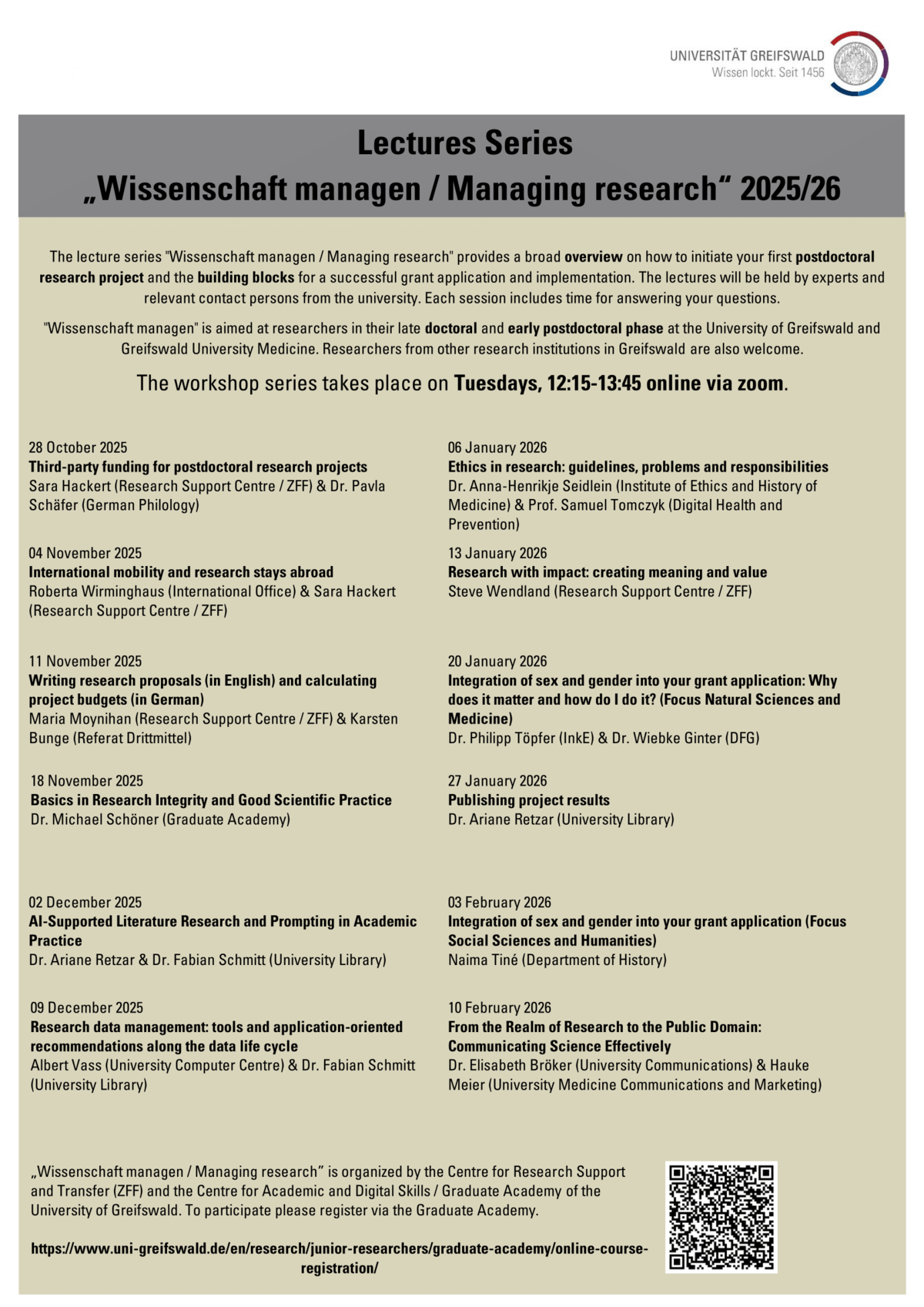Managing research
How do I finance research projects after completing my doctorate? How can I make and deepen international contacts as a postdoc? What do I need to consider when applying for funding and carrying out my research project? Who can I turn to if I need support?
WHAT? The lecture series "Managing research" provides a comprehensive overview of how to initiate your first postdoctoral research project and the building blocks for a successful application and implementation. The lectures are given by experts and relevant contacts at the university. There will be time in each session to answer your questions.
FOR WHOM? "Managing research" is aimed at researchers in the late doctoral and early postdoc phase at the University of Greifswald and Greifswald University Medicine. Researchers from other Greifswald research institutions are also welcome.
CERTIFICATES Certificates of participation can be issued via the Graduate Academy.
Information for participants of the structured programs of the UMG: You must participate in at least 8 courses to receive 2 ECTS.
Topics
The successful acquisition of third-party funding is becoming increasingly important for the postdoctoral academic career path. This event will provide an overview of different possibilities to apply for financial support for your own research project and your own position, and practical advice on how to apply.
Young researchers are expected to be mobile and to establish networks across borders in early stages of the academic careers and to move independently in the international scientific community. A variety of funding institutions and programs are available for this purpose. This event will give you an overview of the most important funding opportunities for short-, medium- and long-term stays abroad (teaching and research), and practical advice on how to apply.
There is no guarantee of success, but with the right approach you can avoid many stumbling blocks when preparing a third-party funding application. In this event, you will receive practical advice on how to find the right funding format, how to present your project, and last but not least, what you need to consider when planning your expenses.
“Scientific integrity forms the basis of trustworthy science”, according to the preamble of the DFG's Guidelines for Safeguarding Good Scientific Practice. The interactive lecture will discuss what scientific integrity and scientific misconduct mean in this context and show that there are gray areas between the two extremes based on the most common problems in questions of supervision, publishing and data management. Participants will be given an overview of the most important national and international regulations on compliance with good scientific practice and will learn about the statutes specific to the University of Greifswald and the existing ombudsman system.
How can research be made visible beyond academia and meaningfully engage the wider public? This is a key question faced by many researchers today. The answer can be found in the effectiveness of science communication, by telling your story in the right format for the respective audience, such as the academic community, policymakers, funding bodies, and especially the general public.
This workshop provides practical insights and specific strategies for communicating your research clearly, confidently, and effectively—whether in conversations with journalists, on social media, or in direct dialogue with the public.
The University Communications Unit at the University of Greifswald and the Communication and Marketing Unit at University Medicine Greifswald will introduce their support services and invite participants to exchange ideas. Whether you are just starting to explore science communication or already working on specific projects, bring your questions and make use of this opportunity for exchange and networking.
How do I assume my responsibility as a researcher, which guidelines do I have to consider when developing a research idea and the subsequent application? Good scientific practice means dealing not only with methodological but also with ethical issues of the research process. For most third-party funding agencies, this idea has already found its way into guidelines and specifications for applications and project design - and is thus standard practice. Important ethical principles should already be reflected upon during the development of a research idea as well as during the application process and should also be taken into account throughout the entire research project.
How do I assume my responsibility as a researcher, what requirements do I have to take into account when developing a research idea and the subsequent application?
Digital data processing has opened up new opportunities for collecting, viewing and publishing research data. The opportunities for data sharing and reuse require new skills in data literacy. A good plan for managing and sharing research assets has become essential to data publications. Data management requirements are becoming increasingly diverse - a monolithic solution alone can no longer meet them all. In this talk, we will discuss the steps of the data life cycle and present the most important concepts for research data. We will also point out solutions provided for researchers through the National Research Data Infrastructure (NFDI) and give an introduction to software tools and advisory services provided by the university computing centre and the university library to tackle the above challenges.
Scientific publishing is one of the core tasks of scientists in order to document and present the results of their own research and ultimately to subject them to a quality check. Today, adequate scientific publishing includes not only the selection of a suitable form and place of publication, but also the securing of usage rights as well as free access (open access) to published research results. The lecture will therefore focus on how to find a suitable publication medium, what open access means, which paths lead to open access publication and which other issues need to be considered in scientific publishing.
Research transfer is about sustainable science. Scientists have a responsibility to make the results of their research accessible and usable for society. However, their full potential often remains untapped because the next step to application does not take place. Using practical methods and inspiring examples, the speaker will show you how scientific research can have a targeted impact beyond the academic context in business, society, and politics. Discover the application potential of your research topic - whether it's a scientific experiment or humanities project - and learn more about exploitation options and application potential for your research results!
The development of AI-based applications is opening up new opportunities in research and teaching. A wide range of tools is now available for literature research. This lecture provides an overview of AI applications in academia, highlights prompting strategies and explains how AI can be used in literature research. Particular attention will be given to a critical reflection on the potential and challenges of AI, while also outlining its practical applications for participants' own research activities.
Sex and gender are basic dimensions of diversity that shape or influence most aspects of life – from the molecular underpinnings of health and disease to asymmetrical distribution of power and resources at the societal level. The importance of sex and gender aspects in research is increasingly recognized by scientific institutions (German Scientific Council/Deutscher Wissenschaftsrat) and funding bodies (e.g., DFG, BMBF). As a consequence, consideration of sex and gender (and other dimensions of diversity) is a formal requirement in grant applications.
REGISTRATION “Managing Research” is organized by the Research Support Centre (ZFF) and the Graduate Academy. To participate, please register here for the lecture series.
WHEN and WHERE?
The workshop series takes place weekly on Tuesdays, 12:15-13:45,online via Zoom. Next start on 28 October 2025.
Sara Hackert
Wollweberstraße 1
17489 Greifswald
Telefon +49 3834 420 1185
managingresearchuni-greifswaldde


